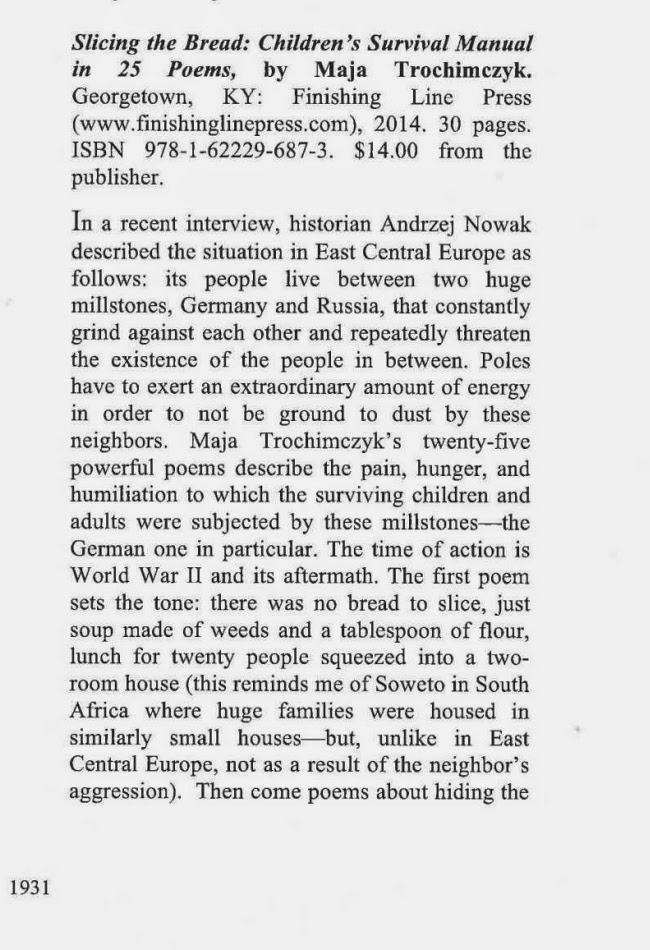The poems also have a life on their own, in their proper context. One of my poems dedicated to the victims of Holocaust, heard not seen ("Bees and the Breeze") was just reprinted in the 17th Annual Yom HaShoah (Holocaust Remembrance Day) issue of the Poetry Super Highway, managed by poet Rick Lupert. It is my second time in this commemorative issue, another poem was published two years ago. There are just a few poems about the Holocaust and its witnesses in the "Slicing the Bread" book. I'm honored to be among the distinguished group of 40 poets, each with a different story to tell, a bitter family history, or a reflection on the unimaginable. It is now children of survivors, children and grandchildren of victims who take upon themselves the task to remember.
http://poetrysuperhighway.com/psh/2015/04/annual-yom-ha-shoah-issue-2015/
Rick picked a photo from the death camp of Majdanek, where many people from Lublin and Warsaw died; these areas are my ancestral lands, so it is good to share this, lest we forget who died, how and why...
_________________________________
The best response to so much suffering is silence, prayer and a resolve to not allow anything like that to happen again.
Like that - wars for financial gain, wars for territorial expansion, genocide for financial gain, genocide for "Lebensraum." We do have such wars today... And what are we doing about them?
An Intermission
She stopped waving the flag at the passing troops
to sigh and say: "It is not my fault. I did not kill the children."
"I did not want this to happen. I did not know..."
He stopped singing the anthem with a hand on his chest
to sigh and say: "It is not my fault. I did not carry the gun.
I did not vote for the war. I did not vote at all."
Why are they saying these things then, if they are not guilty?
These innocent bystanders, the witnesses that did nothing,
The silent, self-righteous ones... Their silence devours their souls.
Their silence screams in the town squares. Their silence
stifles the breath in their lungs. This silence spreads quickly
like the plague of indifference. It is the death of all of us.
Maja Trochimczyk, April 2015.
_____________________________
I have been so pleased that the two reviews published so far of the book have been so positive. I enjoyed the endorsements of my poet friends:
According to Pulitzer-Prize nominated poet John Guzlowski, These “poems about what the Poles suffered both during World War II and The Cold War afterwards are written with the clarity of truth and the fullness of poetry… Here are the stories of how the people she loved experienced hunger and suffering and terror so strong that it defined them and taught her, and teach us, the meaning of family.”
The Tieferet Prize winner and Poets-Café host Lois P. Jones points out that “Maja brings the Warsaw of her youth and that of her ancestors into vivid and heartbreaking detail. These are words that will move you to appreciate the simple privileges and necessities of life. Slicing the Bread is a feast in our universal and ever present famine.” As Jones wisely observes “It is the duty of the poet to convey story, but it is the art of the poet who can transform our often cruel and brutal history and affect forever, the way we look and listen to the world.”
According to Zofia Reklewska-Braun’s review of this volume (Goniec, March 2015), “One wants to read these poems. They attract the attention of the reader, from the first to the last… They are poignant, engaging. The readers’ own memories may become superimposed on these poems, if the reader is a Pole or a Polish Jew. The poems force one to reflect about the painful events from the modern history of Poland.”
Quite fittingly, Zofia Reklewska-Braun's review was printed in a Polish American periodical "Goniec." This book, though about the War and its aftermath in Poland, is written for Polish Americans and for Americans, for those who do not know. All the families that I knew and was a part of had their stories similar to mine, some with more heroism, others with more suffering. None - not affected.
http://www.goniec.net/goniec/inne-dzialy/goniec-poleca/poetycki-podr%C4%99cznik-przetrwania-maja-trochimczyk-%E2%80%93-slicing-the-bread.html
__________________________________
The second review, this time in English, appeared in the venerable Sarmatian Review published by the Polish Institute in Houston, Texas (April 2015). The review by Sally Boss, one of the founders of the Sarmatian Review, praises the insightful yet hopeful poems that "describe the pain, hunger and humiliation" of the victims of the two huge millstones, Germany and Soviet Union, that "constantly grind against each other and repeatedly threaten the existence of the people in between" (a metaphor borrowed from historian Andrzej Nowak).
"Then death, death, and more death - but not the anonymous death of millions, rather the loss of fathers, mothers, uncles, and aunts - sometimes in twenty-four hours, as when the incoming Soviets shot the narrator's uncle int he street and shipped his wife and two sons to Siberia, all in twenty-four hours." The ray of hope found in this book is credited to the "delicacy and gentleness" in approaching the suffering, without condemnation of unnamed murderers, just as a tribute to those they killed.
.JPG)



